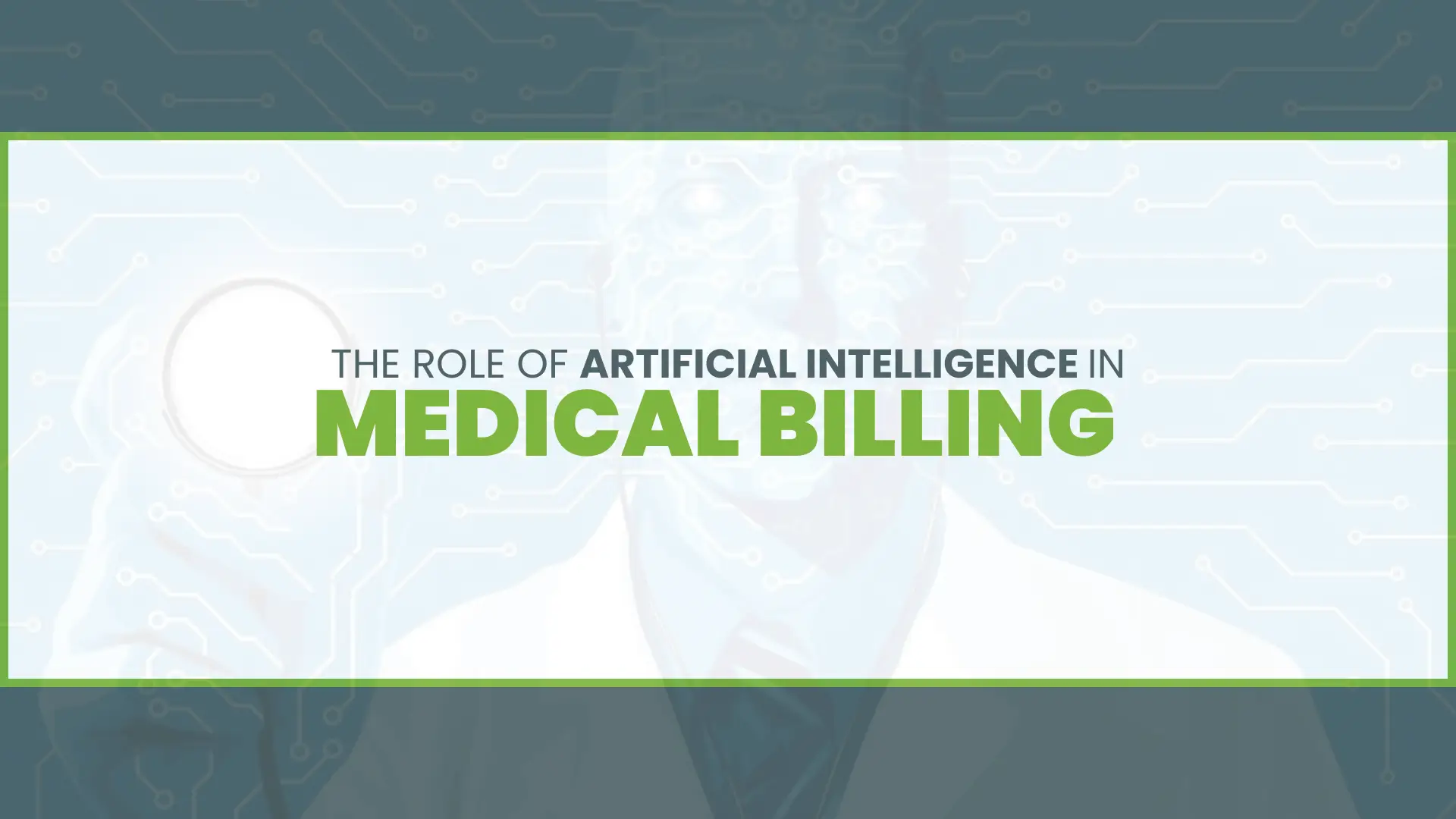A few decades back, the medical billing process was transformed from being manual to being automatic. This has become possible thanks to billing software and new technologies. I bet no biller can maintain the revenue cycle and make a potential profit without using digital systems. Technological innovations have enhanced the efficiency of medical billing processes. It is totally understandable that implementing a digital system for medical billing is expensive and hard to use, but we can’t neglect its power.
Among billing technologies, artificial intelligence has put the billing process to sky-high limits in terms of success because of its dynamic roles. AI helps streamline billing processes, reduce errors, and clear patients’ and payers’ queries on time.
In this article, we will discuss the role of AI in medical billing processes and its benefits. We will also learn about the challenges faced in implementing AI in medical billing. We have also covered some blogs for understanding billing and coding and some solutions related to Billing challenges. So, check them out!
Role of AI in Medical Billing Processes
Medical billing is a process of generating accurate medical bills for the rendered medical services, submitting claims and ensuring reimbursement approval. AI helps to make this process more efficient and quick. We will discuss each stage and the impact of AI on medical billing. We will compare the role of medical biller with AI together to find out its benefits in each step.

1. Correspondence Handling
Medical billers manage emails, phone calls and voicemails to answer patient queries and objections. They should be expert and available 24/7 for this task. However, implementing AI in the healthcare system can be helpful as AI-generated chatbots remain available every moment to answer questions. Even there is no need for recorded messages and voice notes. The AI system keeps all information about the medical billing process and healthcare facility, which helps generate answers accordingly.
2. Verify the Patient’s Information
This is the cornerstone of the medical billing process as it ensures that the patient has insurance coverage. Medical billers manually verify the patient’s demographics and insurance, which takes time and resources. AI-assisted practice management systems automatically verify patients’ information from different platforms, such as EHRs. AI systems are integrated with all healthcare platforms, and verification tasks can be performed in no time and without any error.
3. Assigning Medical Codes
Medical billers and coders should be professional and well-educated to assign codes for specific medical services. Healthcare facilities need to hire expert staff and educate them periodically about new updates and challenges. AI integrated systems can accurately incorporate updated ICT-10 and CPT codes in medical bills according to diagnosis, treatment and other patient care services. The use of incorrect codes is the primary reason for claim rejection and denial, but AI has proved helpful in minimizing coding errors.
4. Submitting and Handling Claims
The benefits of AI for medical billing are countless. Submitting claims seems like a very simple process, but let’s keep the devil in the discussion: claim submission is a very daunting step. Medical bills, documentation records, and other additional information need to be submitted to insurance companies. Complying with such guidelines requires expertise, and medical billers often make mistakes. But AI automatically compiles all data without taking much time, detects errors, if any and submits the claims directly. This saves time and human effort.
Managing denied claims remains very challenging for billers, and failure to manage results in revenue leaks. AI-assisted billing software understands algorithms, detects common error trends and provides solutions to avoid the same mistakes in new billings. In this way, the ratio of denied claims gets reduced. AI also manages denied claims by clearing objections in a timely.
Benefits of AI for Medical Billing
1. Automating Routine Tasks
AI helps to automate all billing processes, from data entry to claim submission. AI is not traditional billing software; instead, it is an integrated system that understands each process and modifies things accordingly. AI automatically enters patient data using natural language processing tools, avoiding human errors. AI-powered tools quickly convert diagnosis and treatment plans into suitable billing codes, reducing human efforts and time.
2. Improved Accuracy
Detecting potential errors and real-time edits powered by AI generate accurate medical bills. Claim denial and rejection rates can be decreased using AI in medical billing processes.
3. Revenue Cycle Management
AI has a thorough understanding of payers’ policies and billing guidelines. AI tailors medical bills in correspondence to those guidelines to speed up claim acceptance. Using AI in medical billing is helpful if you want to grow financially. AI also detects negative patterns in the revenue cycle and suggests measures to enhance revenue generation.
4. Reducing Cost
Medical billing needs an expert team and continuous education to work efficiently. This demands resources and time. However, implementing AI in billing processes reduces human and financial resources as most of the tasks are done automatically. Small medical practices should use AI systems to save money. The saved amount can be invested in enhancing patient care.
5. Enhancing Patient Experience
The impact of AI on medical billing is vast, and enhanced transparency is one. AI systems provide real-time tracking of billing processes for patients. Even AI systems mention estimated medical costs before medical services, which is very helpful for patients to manage their finances. Such AI advantages build patients’ trust and healthcare reputation.
Challenges of Implementing AI in Medical Billing
1. High Initial Cost
Artificial intelligence is the latest technology, and it is very expensive. It can be challenging for small healthcare practices to invest huge sums. However, your initial investment will make your facility financially stable and reputable.
2. Data-Driven Concerns
Medical billing processes deal with sensitive data like patients’ personal information, ailment details and banking details; therefore, privacy must be ensured. AI systems are vulnerable to privacy breaches, and measures should be taken to resolve this issue.
3. Integration with the Existing System
Most healthcare facilities use orthodox systems and computers, while AI only supports the latest systems. So, compatibility between AI and orthodox systems is very low. Launching AI requires replacing old systems with new ones, which is a very daunting measure. Updates should be made in legacy systems to make them compatible for AI use.
4. Regulatory Compliance
Healthcare regulations like HIPAA are complicated, and AI systems can’t comply. IT experts should make changes and updates to enhance the compliance properties of AI in medical billing. Compliance is necessary to avoid legal penalties and get reimbursed on time.
5. Dependence on Data Quality
AI only manages and uses accurate data, but there are many errors in previously recorded data, which may be the roadblock to effective medical billing. Before launching AI in any healthcare facility, medical billers need to verify and rectify all previous data.
Conclusion
Medical billing processes are advancing with the use of modern technologies like artificial intelligence. AI has made this process automated, quick, error-free and reliable. AI is amazingly helping in every billing step. AI has changed the way medical billing processes were done before. Data entry about patients’ demographics, ailment details, management plans and insurance coverage is automated. AI-assisted tools are thoroughly equipped with coding details and assign correct billing codes for all patient care services. So, for correct coding and billing you have to know the main differences between coding and billing. So, for that you can read this linked blog.
Correct coding is essential for timely claim submission and reimbursement. AI also manages denied claims and maximizes revenue generation. Automated data entry, reducing resources, managing revenue cycle and enhancing patient trust are considered benefits of AI in medical billing. Advantages always come with challenges, and this is the case here. High implementation costs and data-driven concerns are common challenges in using AI. Steps are also required to integrate AI with existing systems.
FAQs – People Also Asks
1. Will AI Replace Medical Billing?
It seems impossible that AI can completely replace medical billing, but it is also clear that AI can transform the billing process. AI can streamline the medical billing process by automating data entry and claim submission. AI can assist medical billers in many places, but it can not replace human expertise in managing complex cases. You have to first understand billing and coding working to integrate AI in it.
2. How can AI be used in Medical Billing?
AI can be used to enhance and transform the medical billing process. It can be used to automate medical coding, payment processing, and predictive analysis. Accurate claim submission and error detection are also properties of AI that streamline medical billing.
3. Can AI help with Billing?
Yes, AI can surely help with billing tasks like data entry, information verification, claim submission and fraud detection. It also reduces administrative burden and improves the overall efficiency of medical billing.
4. What is the Future of AI in Medical Coding?
AI has a bright future in medical coding as it has the expertise to translate diagnoses, treatment plans and medical services into suitable medical codes. Advancements like natural language processing and real-time assistance can be helpful in managing complex billing tasks.

